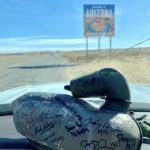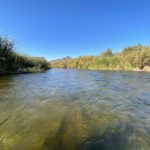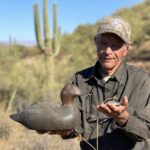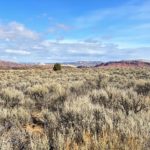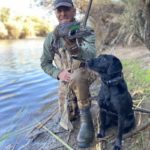On the bank of the Salt River, just outside of Mesa, Arizona, Ramsey Russell visits with Steve Comus, Senior Editor of Safari Club International Safari Magazine for over 2 decades. As usual, meeting with such an experienced hunter that describes hunting as a lifetime journey makes for an interesting conversation. What shotgun does Steve usually hunt with, and why does he think using a 410 is cheating? Why does he usually hunt over a single decoy that’s older than even himself and how’s it work? Why did Walter Cronkite present him an aware back when, and for what? What was his secret as an investigative reporter and why’d he quit? And why does he believe that the heyday of hunting lies ahead? Words of wisdom from Arizona’s Sonora Desert.
Hunting Is a Lifetime Journey Says Steve Comus During an Arizona Duck Hunt
The word Safari means the journey. For me, the journey isn’t a hunt, the journey is a lifetime. The journey has many steps in many places, in many stops, but in the end, and I think here’s where we get back to nature, is if you’ve been a good hunter and an ethical hunter, when it’s all over, it will have been a proud past. – Steve Comus
Arizona Duck Hunt on Salt River
Ramsey Russell: Welcome back to Duck Season Somewhere. I am in the mobile studio just outside of Phoenix, Arizona. It’s an incredible morning this morning, duck hunting on the Salt River public land here to the north of Phoenix. I’m with my friend Steve Comus, longtime editor of Safari Club International magazine. Steve, how are you this morning?
Steve Comus: I’m doing great.
Ramsey Russell: I appreciate you making this long drive to come up and hunt with me this morning on the river.
Steve Comus: I wasn’t going to miss out on that. What the heck! You and I have duck hunted together other places and that’s what hunting buddies do.
Ramsey Russell: That’s exactly what we do. How did this particular hunt with our host, John Odell, Arizona Game and Fish, come about? How did this all come about today?
Steve Comus: Actually, it was last summer, I think. You and I were talking or emailing or something and you mentioned that you’ve never hunted ducks in Arizona. You wanted to know if I knew any places to go or anything and one thing led to another. Originally, I was going to have you come down. I live down in Tucson, Arizona and we were going to be coming down there. Maybe do some jump ducking and stuff like that, because initially it was just, “Well maybe it’s after one duck, this thing in Arizona.” But then we started thinking and I was talking to a buddy of mine who was another member of SCI who also happens to be the county fish commissioner. I said, “Hey Eric, you know those guys in the game department might know some interesting places that Ramsey might want to go duck hunting.” We called up somebody there and one thing led to another and that’s how we ended up here.
Ramsey Russell: It sure worked out good. It was not only a very scenic and typical Arizona duck hunt, but it was very informative. I sure enjoyed this morning’s conversations with yourself and our host, John Odell. We sure covered some world topics this morning, I felt like.
Steve Comus: Sure did.
Ramsey Russell: I didn’t know what to think. We’re sitting here now and we’re outside if anybody can tell, but I’m going to say it’s crowding in the mid 80s. This morning it was a little nippy.I would say, what, 50°, 55° by the time we got down to the river?
Steve Comus: Yeah, something like that.
Ramsey Russell: Yeah. It’s so hard to tell. I knew that an Arizona river was not going to be what I think of as a river. I’m used to looking at a river that’s a mile across. It was hard to tell in the shadow but as it started getting light this mountain stream looking thing was running through here, the Salt River coming in and cattails lined up and bushes all around the edges and the mountain off to the south. It was pretty amazing, pretty spectacular. Char had her work cut out. Whenever the ducks hit the water she had to swim. She’d head straight away and then I’d hear her paws splash and disappear around the corner and sure enough later she’d come up running down a bank with it. Steve, was this morning pretty typical of Arizona duck hunting?
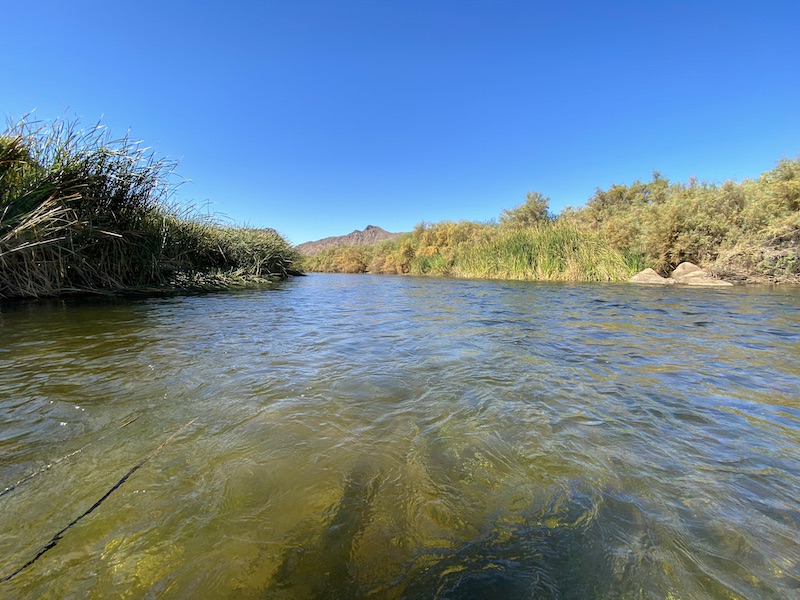
A Single Duck Decoy
I’ve got one decoy, that’s my Arizona decoy spread.
Steve Comus: Well, I don’t know about Arizona duck hunting in general, but it is typical for what duck hunting I’ve done in Arizona. I’ve never had a limit day duck hunting in Arizona myself. Now that happens,I just never have [had that happen]. What I do is I go out and we’ll hit these stock ponds down by Tucson and I’ve got one decoy, that’s my Arizona decoy spread.
Ramsey Russell: Tell us about that decoy. You told me the story this morning. I want to hear more about that decoy.
Steve Comus: It’s over 100 years old. It’s a solid wood decoy. It’s got a lead strap on the bottom of it and it’s got a big lead weight and everything. The cord on there’s about 100 years old, too. I got that one as a kid and it was a very old decoy when I got it. I used it back in Ohio when I lived there. I use it here in the stock ponds. That one decoy seems to work pretty good because they come in. The main difference I’ve noticed is when I’m hunting the stock ponds rarely do they circle around above. More often, they just come straight in.
Ramsey Russell: Straight in?
Steve Comus: Yeah. A lot of times you’ll end up here and something will hit the water before you actually see it if it comes in the back door or something.
Ramsey Russell: You don’t have to lead a duck sitting on the water as much as you do when he’s flying. I have noticed that.
Steve Comus: I’ll tell you what, we’ll make sure they are airborne again. I don’t do that for one very simple reason, that being fun.
Ramsey Russell: Yeah, that’s right, you don’t want to mess up. Do you know where that decoy came from?
Steve Comus: No, I don’t. I’ve got somewhere, in my garage, some very well-known makes of decoys. That one, I don’t think it’s got a name on it. I never looked at it for one. I think it’s a commercial decoy. You know that a heck of a good woodworker made it. What I like about it is that it floats differently than these newer ones.
Ramsey Russell: It does, yeah.
Steve Comus: I’m not going to say it makes a difference except, for me, it works.
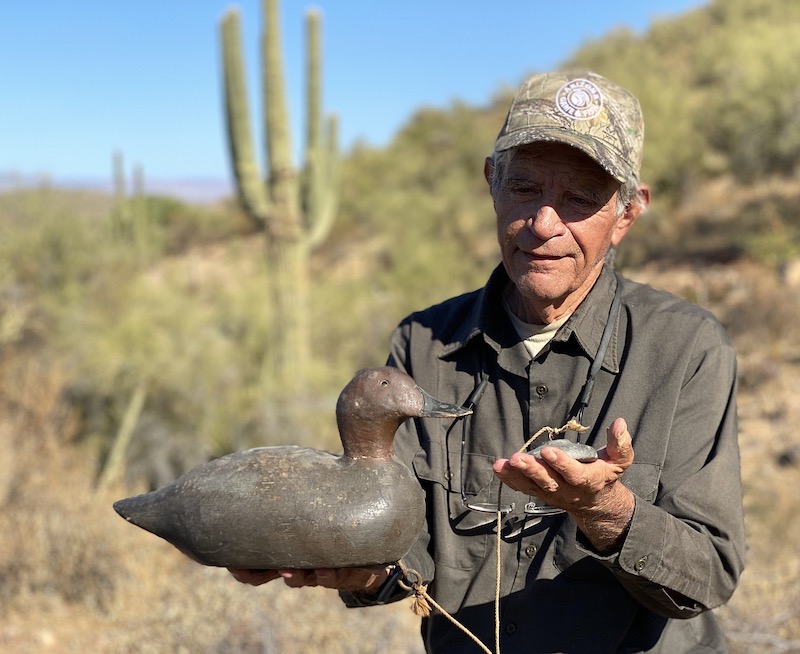
Hunting Near Tucson, Johnny Ringo’s Grave and Other Attractions
Ramsey Russell: Oh absolutely. What is the distinction between hunting down there in Tucson? The stock tanks? It’s more cowboy country. Maybe it’s not. It’s outside the range of duck hunting. I know this morning you were telling me about all kinds of interesting stuff down in that part of the world.
Steve Comus: What happens is, most years, you go out and down there, and I know for me, I usually don’t go out specifically to go duck hunting. I’ll just go out to be out in the wilds and stuff. I’ll have my stuff with me so if I want to go jump duck at the stock pond I can. Or I can go out to shoot a coyote or something like that. it’s not that there’s a mission to do the duck hunting. That’s more of an adjunct of being out there, anyway. Except for when it really freezes over hard up north. We see a lot of ducks coming through and the weird part is I’ve noticed that I can hit the same stock pond day after day and they still come straight in. I don’t think they’re the same ducks; it’s new ducks coming every day from the north or something. Whatever it is, it’s kind of fun because, like I said, I got my decoy spread, I’ll sit down next to a safe bush and that’s my setup.
Ramsey Russell: Wasn’t it down in your neck of the woods, not too far from Tucson, that the O.K. Corral and all that stuff happened?
Steve Comus: Yeah, that was in Tombstone, Arizona, which is kind of southeast of Tucson.
Ramsey Russell: You ever go down and check that out?
Steve Comus: Yeah, it’s kind of a fun town. As a matter of fact, sometime you ought to stop down there.
Ramsey Russell: This whole Arizona visit is kind of like Forrest Gump You go this far, you might as well go a little bit further. I was going to Utah to hunt and I did. Well, that’s a long way from Mississippi, so I might as well pick up some new territory on the way home. Since being here, since this morning, sitting on the creek bank down there talking to y’all, I’ve probably got about three or four more bucket list trips planned in Arizona.
Steve Comus: One thing is, if you do go down that direction, and John’s going to tell you too, is that Johnny Ringo’s grave is down there. We were down there with Tim Joseph from Benelli. We went on a quail hunt down there and got all three kinds of quail on that one hunt.
Ramsey Russell: What quail would those be?
Steve Comus: It can be Gambel’s and scaled and Mearn’s quail.
Ramsey Russell: Oh, y’all do shoot Mearn’s quail down there?
Steve Comus: Yeah. Anyway, his grave was right there in the area where we were hunting. So we stopped for a look, it’s kind of fun.
Ramsey Russell: Wow. “I’m your Huckleberry,” is that what was printed on his headstone?
Steve Comus: No. As a matter of fact, there’s an interesting thing there. There’s both some rocks that are painted and stuff, but also there’s an actual one or two things that explain all about it, poster things.
The real joy for me is I’m out there in the desert, in the wilds, just taking all that in. – Steve Comus
Ramsey Russell: Tell me more about this quail hunting you’ve got down there. Three species of quail. Do y’all use bird dogs or just walk them up?
Steve Comus: We were using bird dogs on that hunt. When I go out on my own, I don’t. I don’t have a dog. I’m not around the house enough to really take care of one. I go out on my own. I’ve got a 410 shotgun I take with me and I walk. I’ve got a hawk screamer call I use and that works a percentage of the time, like when I might see them running ahead of me, I hit that hawk screamer and a lot of times they’ll lock up or hide under something closer to them. One time, figuring it out, I averaged walking about a mile for every quail I put up and so there again, it is not a limit mentality at all. The real joy for me is I’m out there in the desert, in the wilds, just taking all that in, and whatever I get on those birds and stuff, that’s just gravy. I don’t know what it is, I don’t know if many people really feel that way. For me, there’s nothing like walking in the wilds with a gun. I don’t know how to explain it. So that’s what I do. I walk, I walk a lot in the wild with a gun.
Ramsey Russell: I can see that. I can relate to that. Every time I’m walking down a trail like we were this morning, down through the Palo Verde and in the dark following the trail, the stone walls from way-back-when and stuff like that. I don’t know, it feels different than if I were just walking with a camera or walking with a dog or whatever those other people were doing. It’s a multi-use area, you can hear some back there on a motorcycle right now. But, also, it’s a public use area and I knew I wasn’t in Mississippi, like Toto not being in Kansas anymore, when three people with big long lingers came down and walked right up into the decoy and looked around. “How are you all this morning? Oh, you all are hunting? Oh, okay.” Then, shortly thereafter, some kayaks went down the creek and I could hear them talking, like, “What was that? Well, that’s a decoy. I think somebody’s duck hunting or something.” It’s just different. Its public use for everybody. Nobody’s really opposed to hunting around here. It doesn’t seem like it. What were you telling me today? Hunting seems to be just something else to do out here.
Steve Comus: Yeah. You see a lot of that, sometimes in the big cities and stuff they get, anti-hunters. We don’t see a lot of it beyond that. Most people that I know carry guns all the time, anyway. They go hunting because that’s what you do, the season comes along, the whole family goes hunting. A lot of times what a lot of people around Tucson that I know do is put in the draw for the various tags or whatever they’re going to get, then they go out and set up a little camp. Then, those who don’t actually want to go out hunting themselves stay back in camp and take care of [it]. It’s a real family social gathering.
For me, there’s nothing like walking in the wilds with a gun. I don’t know how to explain it. So that’s what I do. I walk, I walk a lot in the wild with a gun.
Ramsey Russell: I think that describes a lot of hunting anywhere and anyway. My favorite times are just on this road trip and just in life in general, anywhere in the world, at home especially. Sure we’re out there hunting but we’re hunting with friends, we’re socializing with them back at camp, we’re eating dinner, we’re preparing meals, we’re potluck suppering, we’re sharing cocktails. The social aspect is so important to hunting.
Steve Comus: Like I said, that is the way that most of the people I know down there do it. I also know some people to go around and other places in the world, but that’s a whole different deal. I’m talking about the ones where they’re hunting close to them and it literally is a family thing. But also, there are usually two or three families who end up together on these things and they’re the same people that may be in the same bowling league or something like that and hunting is just another part of what they do.
Arizona Quail Hunting with .410
Quails’ wing beats are real fast, but you can actually count them if you really focus on it, and if you count the number of wing beats between the time that you perceive the wing beats and the time you take the shot, you will do it a lot quicker with the .410 than you will with 12 or 20
Ramsey Russell: It’s just another part. I don’t really think of Arizona as being duck hunting country but there appears to be quite a few duck hunters. Here’s something I’m interested in: you mentioned shooting those quail with a 410 earlier in the conversation. Can you elaborate a little bit on some of your interesting gun collection? I understand you’ve got some pretty interesting firearms.
Steve Comus: Yeah, I do.
Ramsey Russell: You’ve got 5-10 of them stocked away in the corners of your house?
Steve Comus: Actually, my house is kind of different. A buddy of mine was a contractor who built jails. His crew didn’t have a contract and basically my house is a jail built to keep people out instead of keeping people in. There are a few guns laying around here.
Ramsey Russell: That’s good. What are some of your favorites?
Steve Comus: Usually, it’s the one I got my hand on at the time. I’m kind of an equal opportunity on that. I’m not a serious collector. I’m an aggregator because what happens is, again, I’m kind of weird sometimes, I think, but guns talk to me. I can take two Model 70 Winchesters and one will talk to me and another won’t. When I get a gun, it’s just because that gun talks to me. There’s no other way to put it. I’ve got enough now that I don’t go out looking for anymore, but I’ll hear about one sometimes and get it. My favorite kinds of guns are single shots, especially shotguns. This last dove season we were covered up with doves here, there was a great dove year. I had a break open single shot shotgun and had a great time.
Ramsey Russell: What kind of shotgun was it?
Steve Comus: It was an old Iver Johnson from back in the 50s.
Ramsey Russell: 12 gauge?
Steve Comus: No, .410.
Ramsey Russell: .410?
Steve Comus: .410 actually is my Arizona shotgun for the most part. I showed up today with a 12 gauge but whenever I can I use a .410. The reason why is I’m cheating when I do. A lot of people think that it’s so small, you can’t really get it. The truth is, I shoot two and half inch shells, I don’t shoot three inches, and its got a half ounce going 1200 ft a second. That’s enough to get anything you want. But where you’re cheating is a 410 is so much faster to the shot than a bigger gun because a bigger gun takes you longer to move that much mass. It took me a while to figure that out when I was younger, especially in the South. We did this, down in Mississippi as a matter of fact, quail hunt back there and oddly enough that quail hunt was to be put on by Holland and Holland Royal. I was shooting a little .410, side by side, Holland and Holland Royal, which was a superb gun. Anyway, I was showing those guys. I said, “Okay, quails’ wing beats are real fast, but you can actually count them if you really focus on it, and if you count the number of wing beats between the time that you perceive the wing beats and the time you take the shot, you will do it a lot quicker with the .410 than you will with 12 or 20.” The reason it’s cheating is because in the South, they’re going to hook around a tree or push or something and out here in the desert, they’re going to hook around some bush or something like that, just about the time you’re going to shoot them. With the .410 not [necessarily] because I’m getting them quicker, I not only don’t have to worry about trying to get them when they hook around the bush, but I’m actually getting them closer.
Ramsey Russell: I never really thought about it that way. Now, I’ve never tried to count a quail’s wing beats either, Steve. I don’t know that I can hold my fingers and hold the gun and count my fingers that quickly.
Steve Comus: Please do it at your turn.
Ramsey Russell: I’ve never heard that philosophy before about counting wing beats, let alone that using a .410 was cheating. Most people think it’s a severe handicap.
Steve Comus: Here’s the truth of everything: depending on the choke on the gun, a modified choke on a .410 will shoot the same size pattern as a modified choke on a 12 gauge. It’s just that the pattern won’t be as dense. That’s what I ended up hunting with mainly. I’ve got one .410, got a real tight modified, mainly full choke. In that way when I’m on the hammer, I hit them hard. I’ve got an over and under that’s full in full.
Becoming Editor of SCI’s Safari Magazine
It’s just like hunting. It is a form of hunting, actually. You take every little tidbit of things. Your mind has to be like a steel trap and every tiny little detail gets put away and all of a sudden you start noticing a pattern and you follow that pattern. But you also follow the money, in other words, if you’re looking for something.
Ramsey Russell: Steve, you’ve been the editor of SCI Safari Magazine for a couple decades or more?
Steve Comus: About 21 years.
Ramsey Russell: 21 years. What is your background report? Because I was interested to learn today, some of the pictures you showed me, you and Walter Cronkite. How did that meeting come about?
Steve Comus: I got into this industry. A lot of writers under this industry, that’s where they started. I was a mainline journalist originally and a foreign correspondent and used to work for the Hearst Corporation. I was an investigative reporter for a number of years before I got into the foreign correspondent thing. I did all that kind of stuff and got into outdoor writing. It was really odd. I left Hearst. A buddy and I started up a little weekly newspaper. I helped him out on that for a while. The idea was he built up and sold it and we knew that going in. When it sold out I just looked around for something to do. A buddy of mine who I’d known at Hearst was an editor for a newspaper in California called Western Outdoor News. He called me up one day. They were having some problems with one of their writers that took off some of the sport fishing fleet down in San Diego. He said, “We still have to cover the fishing out there.” He said “You go out and just take pictures and then cover what the fishing tour was like,” and I did. We’re coming back and the skipper of the boat said, “Boy, I didn’t think you’d have the nerve to do that.” I said “Why not?” He said, “Because we got this beef going,” and I said, “Well, not with me.” I said, “This is the first time I’ve ever been on this stuff.” I got back and I chewed out that editor and he started laughing. He said, “Yeah, the real reason I did it for you is because you’re the only guy who could probably come back alive from it,” because back then I had a reputation of being kind of a rough-edge.
Ramsey Russell: You’re a rough-edge?
Steve Comus: Yeah. I’ve mellowed out since then.
Ramsey Russell: As an investigative reporter for Hearst Corporation, what are some of the stories you worked on?
Steve Comus: We covered the thing that we got a press club award that Walter Cronkite presented to me. A buddy of mine and I had done a story on the Mexican mafia.
Ramsey Russell: What era would that have been? That had to have been back in the 70s.
Steve Comus: Yeah, that was the 70s. We did other things like toxic waste dumping. There was a big ring doing that. We investigated that. There’s all kinds of mafia stuff.
Ramsey Russell: That’s always interested me. I’ve seen movies and read some of the stories and I’ll tell you the one thing I hate about “contemporary news.” I miss opening up a big paper like the New York Times or the Washington Post and reading an eight page investigative story, let alone one that goes issue to issue that goes really deep. I’ve always wondered, how did a guy catch a lead and start digging in something everybody’s trying to keep secret?
Steve Comus: That’s actually the fun of it.
Ramsey Russell: That’s what I would think. But how do you do that? Now that they’ve taken away the yellow pages, I have a hard time finding a roofer.
Steve Comus: It’s just like hunting. It is a form of hunting, actually. You take every little tidbit of things. Your mind has to be like a steel trap and every tiny little detail gets put away and all of a sudden you start noticing a pattern and you follow that pattern. But you also follow the money, in other words, if you’re looking for something.
Ramsey Russell: That’s where that saying comes from, isn’t it?
Steve Comus: That’s exactly it. You do that. It is just like hunting. Some of my best sources were secretaries, because if you stop to think about it, they were the ones that actually knew what their bosses were doing. Because they’re the ones that do all the paperwork. We developed a lot of them.
Ramsey Russell: You didn’t just cold-call them. Did you ever stake them out, know where they were going, like in a bar, and try to meet them and strike a conversation with them as a non-reporter?
Steve Comus: Yeah, we knocked on their door at home sometimes.
Ramsey Russell: Did you introduce yourself as the reporter or somebody else?
Steve Comus: No, as a reporter. I never believed in “undercover stuff.” I was a straightforward guy. Let’s look at it this way. I really didn’t want to know anything I couldn’t report because it’s nice to know where to look, but quite frankly, if you can’t use it, what good is it to you? I would like to be both on the record and very straightforward. It’s amazing, if you’re straightforward, how much more cooperative [people] can be because if you’re sneaking around and stuff, people sense that. That’s what it was.
A lot of investigative reporting is kind of boring and tedious, looking through records and stuff like that. But all you do is take a little piece of information and follow the trail and eventually you get there. We used to figure, like in Big League baseball, if we could bat 300, we were big league. A lot of investigative stories you would end up dropping, not because they weren’t good, but because you couldn’t prove it. Now, it’s a different story. Now, they’ll take any liar and just put it out there. That was the reason I left big league journalism, to be quite truthful. I went into the office one day and they said, “Go out and cover the story here,” and I said, “Okay, fine.” They said, “Here’s how the story is going to read.” I said, “Whoa, wait a minute, it hasn’t happened yet. It may be that, it may not if it isn’t.” They said “Well, that’s how it’s going to read,” and I said, “No, not with my name on it it isn’t,” and I walked out and that was it. That was the end of that one.
Ramsey Russell: When you transitioned from that kind of news reporting into outdoor writing, were you able to use the same processes or piece together a bigger story or did you ever do anything like that?
Steve Comus: I think what separates a lot of the stuff I’ve done through the years and the outdoors is that I reported like a regular reporter more than like a storyteller. That way I can get more information to the reader quicker and more efficiently than the other way. The storytelling is fine, it’s great entertainment. But a lot of the stuff we do is when we relay information to make sure they get that.
Ramsey Russell: Just the facts, Jack.
Steve Comus: It’s made a lot easier. For example, when I was doing that kind of stuff, there were no cell phones. In fact, tape recorders were pretty new to the business. They had big ones in studios before, but not on the street. Let’s say I was covering a riot, which they used to do sometimes, we had go down to a payphone, because there wasn’t any cell phones, and you’d call in and they’d have somebody that’s called a rewrite desk who would sit there with a headset to listen to you on the phone with a typewriter and typed out [what you’re saying]. As you’re watching a riot you would have to dictate the story to that person. You start out with the lead and everything else so that you’re not just calling in, “Hey, this is what’s going on.” You’re actually dictating the exact words for the story and that’s a discipline. It’s really nice because in this business I’m able to do a lot more volume and that’s good.
The Future of Hunting
Maybe I’m just an optimistic old geezer, but I think the heyday of hunting is still in the future. I really do.
Ramsey Russell: We talked a little bit about this morning, about future of hunting. Where do you see hunting going? Where do you see outdoor writing and outdoor media type of stuff going in the future? Have you been through the heyday? What are the glory days?
Steve Comus: Actually, maybe I’m just an optimistic old geezer, but I think the heyday of hunting is still in the future. I really do. One thing Johnny brought up this morning, I think he is more than on target, I think he’s absolutely there. I think there’s a future for small game hunting, the likes of which we’ve never seen. I think there are many reasons. One thing is, a lot of these conversations, everybody wants to say, “Well, that’s the one thing here, one thing there, one thing there.” A lot of them don’t think there actually can be many things happening all at once and usually there are. If you look at it that way, I think this pandemic may actually have, in that regard, been a good thing, because it’s caused people to focus elsewhere than where they had been before. Like when somebody is in the army, maybe you’re in a war or something and your buddy gets killed, your whole life changes right then very instantly. This pandemic is about the same thing.
I think if the industry focused more on small game, the industry would definitely be better off. I think hunting itself would, too.
All of a sudden what people had taken for granted all those years, they’re not doing it, but by not doing certain things, they’re finding out they don’t really miss it. That’s what I was thinking about. They’re interested in doing other things. A lot of people want to go out and get their own food and stuff like that, but also to go out and experience nature in a different way. I think if the industry focused more on small game, the industry would definitely be better off. I think hunting itself would, too. When I first started hunting, there weren’t nearly as many deer as there are now. I grew up in Ohio, which now has a lot of big deer, but at that time the only deer in the state were along the Ohio River and in the part of Ohio I was in there hasn’t been a deer in over 100 years. Now, in that same area, they got big bruisers all over the place. That’s a relatively new phenomenon. But back when I grew up hunting small game, if you went hunting, that’s what you hunted and guess what? We were every bit as serious about that as anybody’s ever been about a deer.
Ramsey Russell: It’s funny you should say that the pandemic had an effect on people in their interests because truthfully it’s good and bad and I see a lot of reward in having had six months forced mandatory [time] off to reassess some of my bucket list and some of my goals. I’ve traveled all over the world, I’ve done all this stuff and then it just occurred to me I’ve never hunted Arizona, I’ve never hunted Wisconsin. The next great hunt is closer than you think. It made me start looking and reevaluating some of my priorities and what I could do and what I wanted to do.
I do wholeheartedly agree with you about the small game interest, like we talked about today. I know John Odell with Arizona Game and Fish and I will get more into this in the next episode. But small game, it’s a gateway. It is a gateway to hunting and it’s not just that it’s like a gateway drug, you keep stepping on up, start with squirrels and go to shoot big sheep or something, but it’s accessible and it’s available to everybody. I think it’s relatable because all of us, as children, can relate to shooting squirrels and rabbits and small game and birds as we were growing up, and of course waterfowl falls under that
Steve Comus: Yeah, I’ve hunted everywhere in the world I ever cared to hunt. I still have more fun shooting squirrels than anything else out there. I don’t know why, there’s just something about it. It’s one beauty for bringing people into [hunting]. I think we as hunters have dropped the ball to a degree [because] we are not ambassadors and evangelists for our own cause. All it would take is for every hunter to just make sure that they introduced one or two other people to hunting who wouldn’t be there otherwise. That would go a long way. It doesn’t take that much.
If you think back, hunting is one of the original human activities and so we’ve got a claim on everything in a way. How did those first hunters evolve into what we are today, all through those years? It wasn’t because they went to some hunting university or something, it’s because one hunter showed somebody else, that newcomer, how to hunt. It’s a mentoring thing, and that’s all we got to do. It’s not complicated, but you have to take time to do it. I think that’s one thing that really can make for a very bright future for hunting. I try to introduce anywhere from one to five to ten people a year to hunting. In recent years, a lot of those I’m introducing are girls and young women and they’re extremely interested in it. There was a mindset there for a long time that women don’t hunt, the guys do that. I don’t think that’s ever actually been true. I think women were just told that and people just ignored it. Looking at nature, in very many species, the female is the hunter, like the African lion.
Ramsey Russell: That’s a great point.
Steve Comus: The Greeks and Romans both had goddesses of the hunt.
Ramsey Russell: That’s a fact. I never thought about that. I know there are some young ladies that are experienced and some just getting into hunting that listen to this podcast and I think that’s a very good point, Steve, a very good point. You brought up a good point about learning, about the curve, about going out, and that’s something I feel is being lost in the current narrative, that’s been largely driven by industry, of hunting. It’s to substitute technology for the time honored skill set.
I had gotten out of squirrel hunting. I did it as a little boy. I did it some in college when I shot tree rats or whatever you want to call them. Then my young son, who was going through that phase, he was about 11, 12 years old. He wanted to go squirrel hunting, he wanted me to go with him. I can remember the first weekend we did this and it became a long standing tradition of ours around his birthday, mid-October, to squirrel season. We took three days off and we went and stalked through the woods. He’d go his direction, I’d hear “pew, pew.” I’d hear that 22 going off. I started with a shotgun but after that first hunt I went back to that rifle, that scope rifle and I stalked around and it brings it all the way back. I felt like a little boy again. I felt like a barefoot little boy, only it was better because I wasn’t a little boy, I’ve done this before. I knew how to be quiet, stalk around the woods. I think, unfortunately, that under the current narrative too many people hunting feel like an abject failure if they don’t get a limit or they don’t get something. The point is, I guarantee you the three of us would have shot limits today had they all presented themselves. That’s what we do, we hunt. But that’s not the end-all. To me, it’s the evolution of a hunter.
Take duck hunting, for example. You start off just hoping you can hit a duck, then you hit a duck, you want to shoot a limited duck, then you evolve into shooting drake only or a certain strap for those species with the fewest amount of shot and you begin to self-elevate yourself into the sport at whatever level you are, but I always learn something, like this morning: I’ve never hunted this kind of environment. I’ve hunted the Sonoran Desert, but I’ve never hunted this creek environment in the way we hunted, the way we hid in, the way we did. I learned a little something, and to me it’s not the top of the mountain, it’s the climb. That, to me, is what I’ve always enjoyed about duck hunting, or increasingly enjoyed about duck hunting.
Steve Comus: I work at Safari Club and that’s what that word means. Safari is the journey. For me, the journey isn’t a hunt, the journey is a lifetime. The journey has many steps in many places, in many stops, but in the end, and I think here’s where we get back to nature, is if you’ve been a good hunter and an ethical hunter, when it’s all over, it will have been a proud past. If you look at cave paintings and other kinds of ancient art, the one thing that comes through to me is how proud those hunters who are depicted are. They were honored and proud people. That’s what we need to be, too. Society may have gotten complicated, but animals haven’t, nature hasn’t. Nature is still what it always was. Every time we think that we’ve got it figured out – nature just threw us a pandemic that we can’t handle.
Ramsey Russell: Steve, those are some very wise and profound words to end on. I’m going to leave it at that. To paraphrase, it’s a journey, it’s not a hunt. It doesn’t boil down to a single hunt, it boils down to a lifetime and I think that’s how all of us listening feel about it too. Thank you for being here and thank you for arranging this hunt. It was good to see you again.
Steve Comus: That’s one way to get around it. I really appreciate it.
Ramsey Russell: Folks, you have been listening to Duck Season Somewhere. My friend, longtime editor at Safari Club International Safari Magazine, Mr. Steve Comus. Thank you all for listening. We’ll see you next time.




